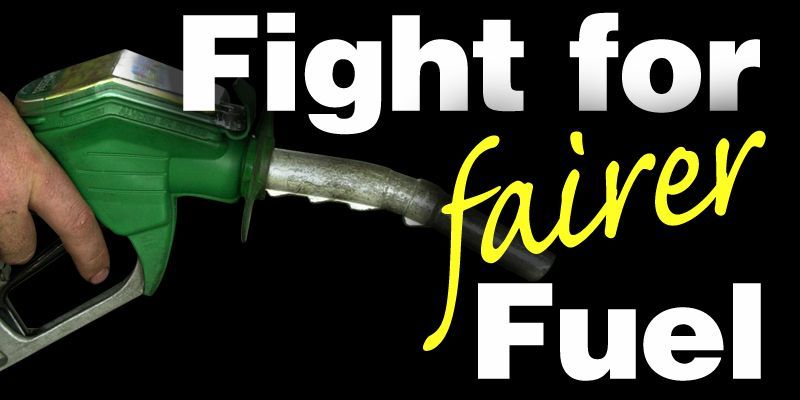George Osborne has given a welcome surprise to motorists by announcing a 1p cut to fuel duty in his Budget.
Mr Osborne also postponed next month’s planned penny rise in fuel duty, and announced the introduction of a fuel stabiliser funded by increasing the supplementary charge on North Sea oil.
His move came just two weeks after The Courier delivered a fairer fuel duty petition of 10,000 signatures to Downing Street, calling for action on rocketing petrol and diesel prices.
The scheduled rise under the fuel duty escalator scheme would have seen prices at pumps rise by the rate of inflation plus 1p a litre adding almost 5p a litre to what are record high prices.
Mr Osborne said he was delaying the April rise until next year and the planned April 2012 rise would be put back to the following summer. He also said the fuel duty escalator would be cancelled for the rest of this parliament.
But he warned the escalator would be re-introduced should oil, priced around $115 a barrel, fall below $75.
The announcement was the centrepiece of a Budget Mr Osborne said would “put fuel into the tank of the British economy” by cutting corporation tax and raising the tax threshold for anyone earning less than £35,000 a year.
“Last year’s emergency Budget was about rescuing the nation’s finances, and paying for the mistakes of the past,” he told MPs. “Today’s Budget is about reforming the nation’s economy, so that we have enduring growth and jobs in the future.
“And it’s about doing what we can to help families with the cost of living and the high oil price.”
However he was forced to downgrade his growth forecasts for this year from 2.1% to 1.7% prompting mockery from Labour leader Ed Miliband in the Commons.
“Every time he comes to this house growth is downgraded,” said Mr Miliband, to cheers from Labour MPs.’Open for business’Mr Osborne also announced plans to reduce corporation tax levels to the lowest of any G7 country, a measure he said would demonstrate that “Britain is open for business.”
Corporation tax, which stands at 28%, will be reduced by 2% this year and then by 1% each year for the next three years.
The chancellor said the shortfall in Treasury income would be offset by adjusting the bank levy rate for next year. He also confirmed plans to raise the personal tax allowance by a further £630, to £8105.
Mr Osborne said the government will press ahead with plans to introduce a standardised state pension of £140, but said this would not affect any current pensioners. He also said there will be regular reviews of the retirement age.
Tobacco duty rates will rise by 2% above inflation and alcohol rates will also go up in line with the previously agreed duty escalator.
But there was some good news for holidaymakers with confirmation that this year’s planned rise in air passenger duty had been postponed for one year. Expected plans for a tax on private aircraft were also confirmed.Young peopleMeanwhile, an estimated 9500 young people in Scotland could benefit from the programme to establish 100,000 new places for unemployed young in a national work experience programme.
And around 4000 unemployed people in Scotland could also benefit from the new enterprise allowance to support 40,000 more people starting their own business.
The Budget establishes the introduction of enterprise zones to encourage new investment, and provision has been made available to enable the Scottish Government to introduce a similar policy if it wishes.
The government has also formally submitted a derogation request to the European Commission for a rural fuel duty rebate pilot scheme.
It was also announced the £4.5 billion Intercity Express programme will see the building of a combination of around 100 electric trains and bi-mode, diesel and electric, intercity trains which will run to east coast mainline stations such as Edinburgh, Aberdeen and Dundee. The first of the new trains enter service by 2016.
Scottish secretary Michael Moore said the Budget was about “helping Scottish households that need it most.”
“These are tight times and we cannot go on a spending spree so it is crucial that we target our help correctly. It is fair to cut the spiralling cost of petrol by taking a bit more from the fast rising profits of the oil and gas sector,” he said.
Continued…
“It is also fair to take another 21,000 low-paid Scots out of income tax altogether next year by raising personal allowances and to cut the income tax bill of 2.2 million low and middle income Scots.
“And it is also fair to give Scotland a competitive edge in industry and job creations. This Budget does that by cutting corporation tax and putting us on a fast track to have the lowest rate in the entire G20 by 2014. This will help companies throughout Scotland.”
But Scotland’s finance minister John Swinney attacked the Budget.
“What is abundantly clear is that the chancellor has used Scotland’s North Sea resources to fuel his Budget,” he said.
“Oil and gas revenues have hit an all-time record level, and are £4 billion up on the previous forecast and has given far too little in return.
“Given that petrol prices have gone up by 16 pence a litre over the past year alone, this windfall could and should be used to bring duty down not by 1p but by five pence UK-wide or if they were applied in Scotland petrol prices could come down by 50p.
“The chancellor is wrong not to use this record bonanza to deliver significantly lower fuel prices, rather than just applying a new levy for a cut that is far too small.”
